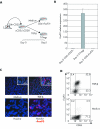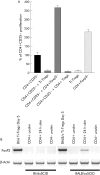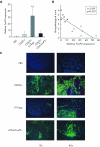Transforming growth factor beta induced FoxP3+ regulatory T cells suppress Th1 mediated experimental colitis
- PMID: 16162681
- PMCID: PMC1856126
- DOI: 10.1136/gut.2005.072801
Transforming growth factor beta induced FoxP3+ regulatory T cells suppress Th1 mediated experimental colitis
Abstract
Background and aims: The imbalance between effector and regulatory T cells plays a central role in the pathogenesis of inflammatory bowel diseases. In addition to the thymus, CD4+CD25+ regulatory T cells can be induced in the periphery from a population of CD25- T cells by treatment with transforming growth factor beta (TGF-beta). Here, we analysed the in vivo function of TGF-beta induced regulatory T (Ti-Treg) cells in experimental colitis.
Methods: Ti-Treg cells were generated in cell culture in the presence or absence of TGF-beta and tested for their regulatory potential in experimental colitis using the CD4+CD62L+ T cell transfer model.
Results: Ti-Treg cells significantly suppressed Th1 mediated colitis on CD4+CD62L+ T cell transfer in vivo, as shown by high resolution endoscopy, histology, immunohistochemistry, and cytokine analysis. Further analysis of in vivo and in vitro expanded Ti-Treg cells showed that exogenous interleukin 2 (IL-2) was crucial for survival and expansion of these cells.
Conclusion: Our data suggest that regulatory Ti-Treg cells expand by TGF-beta and exogenous IL-2 derived from effector T cells at the site of inflammation. In addition to Tr1 and thymic CD4+CD25+ T cells, peripheral Ti-Treg cells emerge as a class of regulatory T cells with therapeutic potential in T cell mediated chronic intestinal inflammation.
Conflict of interest statement
Conflict of interest: None declared.
Comment in
-
T regulatory cell suppression of colitis: the role of TGF-beta.Gut. 2006 May;55(5):604-6. doi: 10.1136/gut.2005.083592. Gut. 2006. PMID: 16609133 Free PMC article.
References
-
- Bouma G, Strober W. The immunological and genetic basis of inflammatory bowel disease. Nat Rev Immunol 20033521–533. - PubMed
-
- Bienenstock J. T cells and the immune response: down‐regulation via mucosal exposure. Can Respir J 19985(suppl A)27A–330. - PubMed
-
- Podolsky D K. The current future understanding of inflammatory bowel disease. Best Pract Res Clin Gastroenterol 200216933–943. - PubMed
-
- MacDonald T T, Monteleone G, Pender S L. Recent developments in the immunology of inflammatory bowel disease. Scand J Immunol 2000512–9. - PubMed
Publication types
MeSH terms
Substances
LinkOut - more resources
Full Text Sources
Other Literature Sources
Medical
Research Materials









